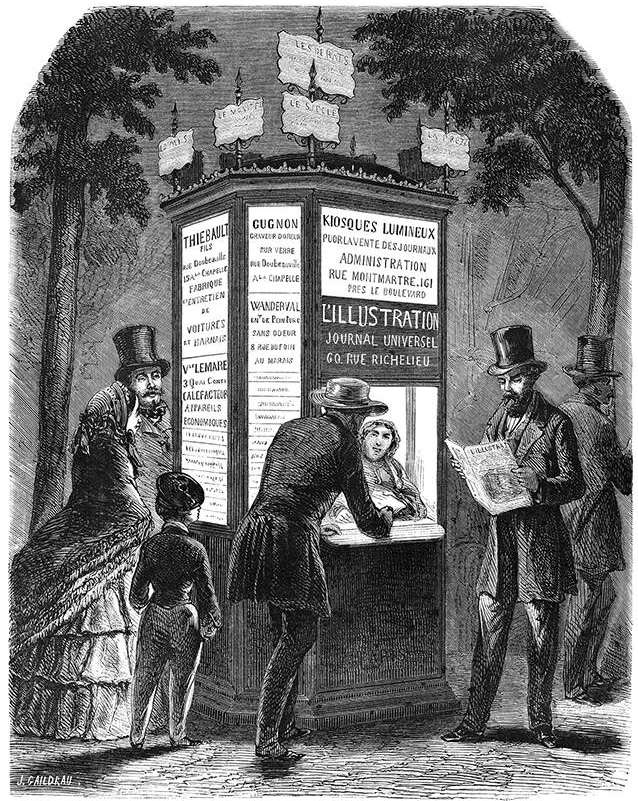Let’s be Fwends #157:
How Long It Takes To Form a Habit, and Other Tales From the Internet

An illumated Newsstand, illustration by Jules Gaildrau, 1857
“Old habit of mind is one of the toughest things to get away from in the world.”
~ Mark Twain, A Connecticut Yankee in King Arthur’s Court
Hello, and welcome to number 157 of Let’s be Fwends. Today, good news about renewable energy sources, so-so news about habit-formation, and kinda no-so-great news about the state of the Internet (horrible, as of recently). And dishwashers. Enjoy!
In 2024, 40% of the World’s Electrical Power came from Clean Sources
Great news! A report published by Ember found that clean energy amounted to 40% of global energy in 2024. While this means that still 60% of all electrical energy comes from non-clean energy, it’s the trajectory that counts. And while the majority of clean energy is still produced by hydro power (which remains stable, unfortunately), solar is quickly picking up, mostly because it is so extremely cheap that “over-building” solar capacities to satisfy spikes in demand become viable.
The fantastic blog Construction Physics has more on the engineering aspects of solar energy. Here’s the conclusion:
“The main advantage of solar, aside from environmental considerations, is its low cost. A solar cell requires no fuel, has no moving parts, can be produced in large-scale factories in enormous volumes, and requires very little maintenance. Lay it down on the ground and it will start generating electric power, no muss no fuss. The main drawback of solar is that we can’t control when the sun shines: day/night cycles, clouds, and seasonal changes in the sun’s position all reduce how much our solar panel generates, and make it hard to generate a given amount of electricity reliably. The greater the share of electricity supplied by solar power, the more extensive the infrastructure required to overcome this drawback, and the higher the cost. But as the costs of solar continue to fall, this drawback becomes less binding, and it becomes economically justifiable to “overbuild” solar infrastructure and use it to serve increasingly large fractions of our energy demand.
How Long Does it REALLY Take to Form a Habit?
When I quit smoking (from two packs a day to zero, with the help of nicotine patches), I observed something I was already warned about: Spikes in craving on the multitudes of 3: The first severe craving came after 3 hours, then again after 3 days, yet again after 3 weeks. And then, it was gone, just to rear its ugly head after 3 years.
I have absolutely no idea if there is any valid scientific reason behind this, and the pseudo-number-mystical repetition of “3” makes me highly suspicious. But it does rhyme with the established idea that it takes around 21 days (three weeks, how convenient) to form a new habit.
Sadly, it couldn’t be further from the truth. In reality, it takes around 66 days, but with a wild variance.
So, you might need to stick with your resolutions for two months, not three weeks before they transform into new habits. On average. It could also be eight months. The good news? Consistency is not as important as thought. Showing up is what counts.
An Oral History of Hotwired
I think Wired magazine, and its online sister Hotwired, played a critical role in bringing hacker culture and cyberpunk to the mainstream. They managed to make it more palatable by taking away a lot of its obscurity while keeping it nerdy - and adding a ton of “business casual” to it.
Was this a good thing? It’s hard to tell. But maybe it was inevitable. This is also the sentiment of the people behind Hotwired, as written here in their Oral History of Hotwired
“Back in those days, we’d say, The nice thing about the internet is how safe it is. Everybody’s there to help you, and everybody just wants to do good things. People asked, Why require passwords for stuff, because who’s going to do anything terrible on the internet?”
Yeah. Well. Those were the days.
It still bewilders me how something with so much potential for liberation (economically, societally, emotionally) turned out to be one of humankinds most devastating tools for oppression. I mean - which one of you can wholeheartedly say that their Internet-consumption is a net-positive for their mental health?
Rewilding the Internet
“For tech giants, the long period of open internet evolution is over. Their internet is not an ecosystem. It’s a zoo.”
Is rewilding the Internet really the answer? Do we really need a new Internet? And if so - how could that look like? How can you create such a wild internet when seven out of the ten most valuable companies in the world are actively working on subdue it? What’s the playbook for that?
As the Internet turns into yet-another-consumerism-media-thing, maybe it is time to just leave it behind to build something new. Just like we all abandoned the old media to create the new media (just to watch it turned into old media again).
Let’s Be Fwends from the Past
Recently, I re-visited the ideas of fear and negativity of thought. So, reading Let’s be Fwends from a year ago about how fear of regret shapes our thoughts was a welcome serendipitous moment for me.
How does a finish line camera actually work? Or a dishwasher? Answers to essential questions in Let’s Be Fwends from four years ago.
That’s it for this edition of Let’s be Fwends. Obviously, you’re forming that habit of reading these mails to the end. That’s awfully nice of you! Thank you! 🤩
Subscribe to Let's be Fwends